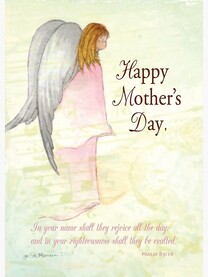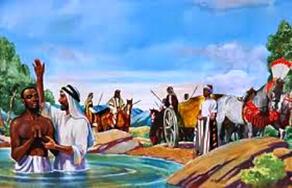
John 15: 9-17; 1 John 6: 1-6
“Are you mom enough?” so once asked a Time Magazine’s provocative article - portraying on the cover a three-year-old boy breastfeeding. The article describes a movement called “attachment parenting” where children sleep in the parent’s bed, when young are carried around in a sling, breastfeed on demand and weaned when the child wants to. “On the other hand, we have the advice from the book, “Battle Hymn of the Tiger Mother,” which extolls parents to be strict disciplinarians, setting forth grueling regime of musical lessons, academics and high expectations that will land your child into Harvard. Who here knows the term Helicopter parents? Parents hovering around their offspring’s social science and science projects, checking and double-checking homework, deeply engaged in all aspects of their social lives.
Before that, in my day, it was the battle between the stay-at-home moms vs. the moms who worked –the ones who always brought the store-baked cupcakes to the school bake sales (guilty as charged). It was the moms who choose midwives vs. those who went with obstetricians. It was the moms who chose labor without medications vs. those who demanded drugs at the first contraction. It was the moms who insisted on organic baby food and cloth diapers, those who felt beechnut and pampers were just fine.
Some of us are products of the Dr, Spock guide to baby and childcare, empowering parents to just follow their instinct. In his heyday Dr. Spock books outsold everything except the bible. Now there are elders among us, or even our parents and grandparents, were reared with the scientific methods of John Watson who chided mothers for their indulgence, warned about the dangers of "too much mother love," and prescribed strictly regimented feeding schedules for infants. Of course, there’s the age-old Biblical proverb “Whoever spares the rod hates their children, but the one who loves their children is careful to discipline them.” Proverbs 13:24. Welcome to the brave new world of motherhood, parenthood, USA!
Mother’s Day, which is celebrated today a secular holiday. There are some churches that won’t mention Mother’s Day as a point of principle. Frankly, it can be difficult holiday to observe – not everyone was raised by a wonderful mom. Some of us are estranged from our mothers, or our moms are dead. Some of us are not mothers, or cannot bear children, or have lost a child or pregnancy in one way or another. Some of our children don’t fit the well-adjusted, well-rounded mold – they are sick, disabled or have other problems. How do we honor the totality of the human and spiritual experience that comprises motherhood?
Our lives have been touched and shaped by the women in our lives--mothers, whether biological or not, or a grandma, auntie, sister, relative, teacher, boss, neighbor or a friend – someone who laid down their life, gave up or deferred a dream—sat in patience, out of love and care for us. Women who encouraged us, believed in us when no one else did – who saw something that no one else did -- doing what John speaks about in our gospel lesson: to love each other as God has loved us. Jesus adds there is no greater love than to lay down one’s life for a friend. When we lay something down, we let it go. That’s what love teaches us—to let go -- of our life – not just physically—but let go of control of outcomes, let go of our expectations, of self-centered actions -- in order to help others, to let them blossom as God ordained them to be.
Some of us are lucky as adults, to consider our mother as a special friend. Friendship in Jesus’ time was a very serious matter. To be considered a friend was an honor. Being a friend meant being treated as kin.
So, our Mother’s Day readings invites us to lay down our preconceived ideas of God – of love -- to enter into kinship and friendship with Jesus. So today we also celebrate the feminine images of God in scripture that teach us about love. In Scripture we hear of a God described as a woman in labor (Isa. 42:14) a mother suckling her child (Num. 11:12), a mother who does not forget the child she nurses (Isa. 49:14-15), a mother who comforts her children (Isa. 66:12-13), a mother who births and protects Israel (Isa. 46:3-4, Dt. 32:18) -- a mother who calls, teaches, holds, heals and feeds her young (Hosea 11:1-4). We see God as a seamstress making clothes for Israel to wear (Neh. 9:21), God as a midwife attending a birth (Ps. 22:9-10a, 71:6; Isa. 66:9), God as a woman working leaven into bread (Lk. 13:18-21), God as a woman seeking a lost coin (Lk. 15:8-10). God like a female bird protecting her young (Ps. 17:8, 36:7, 57:1, 91:1, 4; Isa. 31:5; Dt. 32:11-12), and like a female eagle (Dt. 32) who hunts and bears the eaglets on her wings (Cf. Ex. 19:4, Job 39:27-30), God like a mother hen (Mt. 23:37, Lk. 13:34; Ruth 2:12) who gathers her brood under her. A God who is like a Mother Bear (Hos.13:8), whose rage against those who withhold gratitude is like that of a bear "robbed of her cubs." God as Holy Spirit (which in Hebrew and Greek is feminine) often associated with the birthing process (Jn. 3:5; cf. Jn. 1:13, 1 Jn. 4:7b, 5:1, 4, 18), consoling, comforting, and inspiring. All these images show feminine power to lay down our lives, endure hardship, to care, and sacrifice – all rooted in the love of God. Scriptures go even further – God says through the prophet Isaiah: “Can a mother forget the baby at her breast and have no compassion on the child she has borne? Though she may forget, I will not forget you!” (Is. 49:15).
Contrast these biblical images with cultural messages on TV and other media. This 28-billion-dollar industry wants to make sure we don’t forget the cards, flowers, chocolates, special dinners, fancy jewelry, clothes, spa treatments that moms deserve. Ads even pop up when I turn on my kindle, directing me to local florists. How creepy is that?! Yes, get the flowers and make a special dinner, but let’s not stop there. Mother’s Day, as originally intended in the US, calls us to lay down our lives, out of love.
Mothers’ Day in the US came about because a woman named Anna Jarvis, wanted to honor her mother, Anna Reeves Jarvis. Mother Jarvis was a lifelong active Methodist. Mother Jarvis organized medical services for soldiers and civilians on both sides of the conflict during the Civil War. Shortly after the Civil War, Mother Jarvis organized events to address the poor health conditions in her West Virginia community. She called it Mother’s Work Day, and she went on to organize other local Mother’s Friendship Days to help heal the scars of the Civil War. She did this, despite the personal tragedy of losing four of her children to disease. In all, eight of her twelve children died before reaching adulthood.
Also affected by the ravages of war, the poet and philanthropist Julia Ward Howe also proposed in 1872 an annual Mother’s Day for Peace -- to honor peace, motherhood and womanhood. Howe envisioned Mother's Day as "a worldwide protest of women against the cruelties of war." She made this Mother’s Day Proclamation: “Arise, then, women of this day! .... We women of one country will be too tender of those of another country to allow our sons to be trained to injure theirs. From the bosom of the devastated earth a voice goes up …. It says, "Disarm, Disarm!" …Let (women) them then ..take counsel with each other.. whereby the great human family can live in peace, and each bearing the sacred impress, not of Caesar, but of God.” Mother Jarvis also called for a special day for prayers for mothers, children, and for non-violent solutions for disputes between nations.
In 1905 Anna Jarvis swore to dedicate her life to her mother’s projects. Anna Jarvis’ letter-writing campaign led directly to the establishment of a Mother's Day. So, on this day, May 9, in 1914, by an act of Congress, President Woodrow Wilson proclaimed the second Sunday in May as Mother's Day.
Sadly, Anna Jarvis became quickly disillusioned with how Mother's Day evolved, that it deviated from the intent to honor the work of mothers as social reformers, activists, and peacemakers. She was against the money-making machine that emerged out of Mother’s Day observations.
We face the very same dilemma. What could that 28.1 billion dollars we spend on flowers and trinkets and dinners accomplish in terms of maternal health in developing nations? Giving birth is still risky business in many parts of the world. Many bleed to death, leaving a family of orphans. Many mothers are still illiterate and can’t feed their children adequately. Mother Jarvis and Julia Ward Howe, would want us to honor our biological or spiritual mothers by befriending and laying down our lives for all mothers, everywhere. Because there is no greater love than this. Uplifting the mothers in need in this world uplifts future generations and uplifts, justice, peace and love.
So, this is how do we honor our mother God, and all who serve in her name -- all the women and men who are surrogate mothers, who nurture and care for us, Who lay down their lives for others. Who abide with us, whether you follow Dr. Watson, Dr. Spock, attachment parenting or being a tiger mother. Who want the best for all through acts of justice and love.
So lay down your life. Aspire to the greater love for those in your life. Be a friend to someone in need. Be a mother. In this way joy will shine in us and through us to touch those who God has entrusted to us. And have a Happy Blessed, Mother’s Day, whoever you are, and may this greater love guide all you do. Amen.



 RSS Feed
RSS Feed